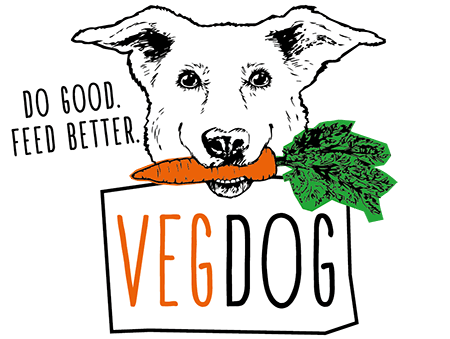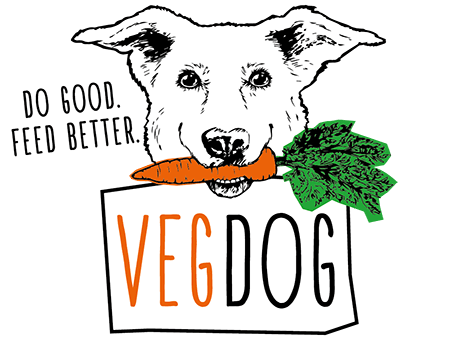
DAS SAGT DIE WISSENSCHAFT ZU VEGANER HUNDEERNÄHRUNG
Eine ausgewogene pflanzliche Hundeernährung deckt den Bedarf an Nährstoffen perfekt, wirkt sich besonders bei Futtermittelallergie positiv auf die Gesundheit aus und verkleinert den CO2-Fußabdruck beträchtlich.
All das ist wissenschaftlich untersucht und bestätigt – hier finden Sie die wichtigsten aktuellen Studien zum Thema.
Abstract:
The number of pet animals in the European Union is increasing over the last decades. Few studies with a limited focus in terms of impacts and life cycle stages exist that assess the environmental impacts of dogs. This paper addresses the entire life cycle of a dog. An LCA study on an average dog was conducted considering the pet food and dog excrements, i.e., urine and feces. Fifteen impact categories were analyzed. An average dog has a climate change and freshwater eutrophication potential of around 8200 kg CO2eq and 5.0 kg Peq., respectively. The main contribution to most impact categories over the dog’s life is caused by pet food. Freshwater eutrophication is mainly determined by the dog ́s urine and feces. Feces also have a significant contribution to the category of freshwater ecotoxicity. Impacts increase significantly with increasing weight and a longer lifetime of the dog as well as low collection rates of the feces. This LCA study reveals that pet dogs can have a significant environmental impact, e.g., around 7% of the annual climate change impact of an average EU citizen. Optimizing pet food and increasing the feces ́ collection rate can reduce the impacts.
Link: https://depositonce.tu-berlin.de/handle/11303/11439
Summary:
Many dog owners wish to feed their dogs a vegetarian diet for the same ethical reason that they themselves are vegetarian. To meet this demand, there are an increasing number of vegetarian diets and recipes available for dogs. However, proof for their claims of nutritional adequacy is often lacking. There is little doubt that a dog’s nutritional requirements can be met from a diet that does not contain meat; however, the difference between the amino acid profiles of plant and animal proteins must be considered. It has been shown that exercising dogs may develop anaemia when fed unbalanced plant- protein diets but will remain in good health if the meat- free diet is correctly balanced. Many plant ingredients contain high levels of non-starch polysaccharides and other anti-nutritive factors, which may reduce the availability of some nutrients. A diet devoid of animal ingredients is also likely to be of low palatability to dogs. All diets should be correctly formulated to meet nutrient requirements based on chemical analysis and predicted or measured apparent digestibility, should be sufficiently palatable to ensure adequate dietary intake and should maintain good health when consumed. If a vegetarian diet meets all of these criteria, then it is a suitable diet for the dog, irrespective of the owner’s motivation for feeding a vegetarian diet.
Link: https://www.ethicalpets.co.uk/blog/wp-content/uploads/2019/07/brown-raan-2009-vegetarian-dog.pdf
Summary:
This research was conducted at the Department of Animal Husbandry in the Veterinary Academy of the Lithuanian University of Health Sciences in 2019. In this investigation, dogs in Scheer, Germany, were fed two different diets: vegan and meat-based.
The nutritional adequacy of a vegan diet was determined by analysis of blood samples from 40 dogs, 20 of which were fed a 100% plant-based vegan diet for an average of 2.15 years, and a control group of 20 were fed a meat-based diet. The results showed the same number of surpluses in both groups; however, the vegan group had only two nutritional deficiencies compared to 11 in the meat fed group. Statistically significant differences (p < 0.01) were found between the groups in iron, vitamin B12 and folic acid concentrations. Total protein, calcium and magnesium were not significantly different (p > 0.05).
To further evaluate the impact of a plant-based diet on dog health; eight dogs were put on a six-week feeding trial. The dogs were split into two groups of four dogs each; the control group was fed a meat-based diet, and the other group was fed a vegan diet. Blood analyses were performed prior to the start and at the end of the trial. The results showed that most of the values were not significantly changed. Some folic acid, B12 and iron deficiencies detected prior to the trial reachedrecommended healthy ranges during the trial on a vegan diet, although one dog experienced a folic acid surplus and another dog a folic acid deficiency.
All participants from all groups were determined to be in overall good health or in a condition that would not affect the blood chemistry parameters. These included total protein, vitamin B12, folic acid, calcium, magnesium, iron, taurine and L-carnitine. Laboratories analysing blood samples in Germany were Laboklin (seven samples), EasyLAB (two samples), IDEXX (37 samples), SYNLAB (one sample); in Australia, ASAP LABORATORY (two samples); and in England, AXIOM VETERINARY LABORATORIES (two samples). Veterinarians performed physical examinations during blood sample collection in various cities in Germany (including Stuttgart and Regensburg), England (Newton Abbot) and Australia (Melbourne).
To collect additional data from dog owners feeding a vegan or partially vegan diet, a questionnaire (initially presented to several thousand potential participants) was completed by 250 people.
Blood chemistry analysis and physical examinations of the vegan dogs in this study together clearly indicate that a vegan diet can be healthy and adequate for dogs, and in some cases, even improve overall health. The additional data collected from 250 dog owners feeding a plant-based diet strongly supported this conclusion.
Link: https://vegan-dogfood.co.uk/wp-content/uploads/2020/10/MastersThesisEffectsVeganDiet.pdf
Abstract:
Trends in companion animal nutrition often mirror trends in human nutrition, reflecting the desire of pet owners to feed diets that they consider healthy and beneficial for the well-being of their pets.1–3 The number of people choosing to eat a plant-based diet and adopting a vegan lifestyle has been steadily increasing as individuals seek a lifestyle that they perceive to be healthier and with less impact on animals and the environment.4–6 It has been suggested that eliminating meat from the diet is more prevalent among pet owners than for the general public.7–9 Many of these meat-avoiding individuals have a moral dilemma regarding the husbandry of carnivorous pets: they avoid animal products in their own diet, but they live with pets that rely on nutritional sustenance from products derived from other animals.7
Interest in, and availability of, plant-based diets are growing in popularity in the North American pet food market,10,11 but there are little data to support the benefits of feeding plant-based diets to omnivorous and carnivorous pets. For dogs, most essential nutrients can be obtained from plant sources.12 However, dogs evolved while eating an omnivorous diet that was high in animal tissues,13 which leads to concerns about whether plant-based diets can completely satisfy the nutritional requirements of dogs. Few studies have been conducted to examine the nutritional sufficiency of plant-based diets. Investigators of published studies14–17,a simply evaluated the content of some nutrients in plant-based diets or evaluated a limited number of health variables in dogs fed plant-based diets.
The purpose of the information reported here was to address nutrients of concern when formulating plant-based diets and how to satisfy nutrient requirements of dogs without the use of animal-derived ingredients. It was intended to assist veterinarians when evaluating plant-based diets and providing guidance to pet owners who wish to feed their dogs such diets.
Link: https://doi.org/10.2460/javma.253.11.1425
Abstract:
Cereals with low environmental input like rye and animal by-products which cannot be used for human food like feather meal are receiving growing interest as sustainable feed sources. Thus, eight Beagle dogs were included in a 4 x 4 Latin Square design and received a vegetarian basic diet or the same diets supplemented with hydrolyzed feather meal (2.7%) and either 20.1% of corn meal, 60.4% of fermented rye or 20.1% of rye as is basis (moisture content of the diets about 42%). Compared to other groups the dry matter (DM) content of feces from dogs fed the basic diet was higher (30.0%, p < 0.05), while dogs fed the basic diet + rye had the lowest DM-content (26.5%, p < 0.05). However, the fecal scores were considered to be within an acceptable range (well-formed and firm). Starch digestibility was lower (p < 0.05) for dogs fed the basic diet + corn meal. The dogs showed a high and identical acceptance (scoring of food intake) of the experimental diets. As a comparable quality of feces and a high nutrient digestibility were observed when rye was used in the experimental diets — it can be considered an alternative carbohydrate source in dog foods.
Link: https://elib.tiho-hannover.de/servlets/MCRFileNodeServlet/tiho_derivate_00000969/animals-11-00496.pdf
Abstract:
There is dearth of knowledge with regards to mineral digestibility of ingredients in canines, and current knowledge is focused on the digestibility of supplemented minerals, not on intrinsic mineral digestibility of ingredients. The objectives of the present study were to determine the apparent and true digestibility (TD) of macronutrients and micronutrients, and the total tract gastrointestinal endogenous nutrient outputs in canines fed either animal- or vegetable-based adult maintenance diets. Eight purpose bred Beagles (two intact males, six spayed females) of similar age (2.12 ± 0.35 yr, mean ± SD) and weight (9.92 ± 0.73 kg, mean ± SD) were pair housed in kennels but fed individually based on individual maintenance energy requirements. Two basal diets (animal and vegetable protein based) were formulated to meet nutritional requirements of adult canines. Two additional trial diets were created, using the basal diets, by diluting diets by 50% with anhydrous α-D-glucose to attempt to quantify endogenous mineral losses and enable calculation of TD. All diets contained titanium dioxide at 0.3% for calculations of nutrient digestibility. Dogs were provided with deionized water as their only source of water throughout the trial. Dogs in a specific kennel were randomly assigned to an experimental diet for 10 d (experimental period), and fecal samples were collected the last 4 d of each period. All dogs were fed all experimental diets in random order based on a 4 × 4 replicated Latin square design. Dogs fed intact diets had a higher apparent mineral digestibility compared to dogs fed diluted diets (P < 0.05). Apparent phosphorus digestibility was higher for dogs fed the diet 2 compared with the diet 1 (P = 0.01) and the diluted diets (P < 0.001). There was a trend towards a greater TD of Cu for dogs fed the diet 2 compared with the diet 1 (P = 0.08). P, Mg, Zn, and Mn true digestibilities were higher for dogs fed the diet 2 compared with the diet 1 (P < 0.05, P = 0.01, P = 0.02, P = 0.009, respectively). These results suggest that apparent and TD do not result in similar values. Further research should be conducted on TD in canines only if a better model is developed.
Link: https://doi.org/10.1093/jas/skz001
Abstract:
The domestication of dogs was an important episode in the development of human civilization. The precise timing and location of this event is debated1,2,3,4,5 and little is known about the genetic changes that accompanied the transformation of ancient wolves into domestic dogs. Here we conduct whole-genome resequencing of dogs and wolves to identify 3.8 million genetic variants used to identify 36 genomic regions that probably represent targets for selection during dog domestication. Nineteen of these regions contain genes important in brain function, eight of which belong to nervous system development pathways and potentially underlie behavioural changes central to dog domestication6. Ten genes with key roles in starch digestion and fat metabolism also show signals of selection. We identify candidate mutations in key genes and provide functional support for an increased starch digestion in dogs relative to wolves. Our results indicate that novel adaptations allowing the early ancestors of modern dogs to thrive on a diet rich in starch, relative to the carnivorous diet of wolves, constituted a crucial step in the early domestication of dogs.
Link: https://doi.org/10.1038/nature11837
Abstract:
Research on the evolution of dog foraging and diet has largely focused on scavenging during their initial domestication and genetic adaptations to starch-rich food environments following the advent of agriculture. The Siberian archaeological record evidences other critical shifts in dog foraging and diet that likely characterize Holocene dogs globally. By the Middle Holocene, body size reconstruction for Siberia dogs indicates that most were far smaller than Pleistocene wolves. This contributed to dogs’ tendencies to scavenge, feed on small prey, and reduce social foraging. Stable carbon and nitrogen isotope analysis of Siberian dogs reveals that their diets were more diverse than those of Pleistocene wolves. This included habitual consumption of marine and freshwater foods by the Middle Holocene and reliance on C4 foods by the Late Holocene. Feeding on such foods and anthropogenic waste increased dogs’ exposure to microbes, affected their gut microbiomes, and shaped long-term dog population history.
Link: https://www.science.org/doi/10.1126/sciadv.abo6493
Abstract:
Consumer demand for commercially prepared plant-based (PB) dog food is increasing, but studies evaluating the short- or long-term effects of PB diets on canine health are lacking. The objective of this study was to assess the short-term amino acid (AA), clinicopathologic, and echocardiographic findings in 34 client-owned dogs fed a commercial extruded plant-based diet (PBD) in which pea protein was the primary protein source and 4 control dogs fed a commercial extruded traditional diet (TD). Plasma AA and whole blood taurine concentrations were measured in dogs at baseline and after 4 weeks on the PBD or the TD. Hematologic, serum biochemical, and echocardiographic testing were performed at baseline and after 12 weeks on the PBD or the TD. Four dogs in the PBD group did not complete the study. All essential AAs, except methionine, were higher in dogs after 4 weeks on the PBD compared to baseline. Taurine (plasma and whole blood) was also higher after 4 weeks on the PBD compared to baseline. A meaningful difference was detected in whole blood taurine between the PBD group and the control group at 4 weeks (P = .026) with the PBD group being higher. Median hematologic and biochemical results for the PBD group were within normal limits at baseline and at 12 weeks. In the PBD group, left ventricular internal diastolic dimension (LVIDd, P = < .001) and normalized LVIDd (P = .031) were higher 12 weeks post-PBD compared to baseline. There were no meaningful differences in left ventricular internal systolic dimension (LVIDs), normalized LVIDs, or fractional shortening 12 weeks post-PBD. There was no statistical evidence of difference between the 2 groups of dogs for any of the echocardiographic parameters at baseline or at 12 weeks. Essential AA or taurine deficiency was not observed in this cohort of dogs fed a commercial extruded PBD. Additionally, clinically relevant hematologic, serum biochemical and echocardiographic alterations were not detected. Further research is required to determine if long-term static feeding of PB diets can meet and maintain AA and other nutrient targets in dogs.
Link: https://doi.org/10.1371/journal.pone.0258044
Abstract:
There has been an increase in vegetarianism and veganism in human populations. This trend also appears to be occurring in companion animals, with guardians preferring to feed their animals in accordance with their own dietary values and choices. However, there has been controversy amongst vets and online commentators about the safety of feeding vegan diets to carnivorous species, such as cats and dogs. In spite of this controversy, to date there has been no systematic evaluation of the evidence on this topic. A systematic search of Medline, Scopus, and Web of Science was performed, identifying 16 studies on the impact of vegan diets on cat and dog health. Studies were appraised for quality using established critical appraisal tools or reporting guidelines. There was considerable heterogeneity in the outcomes measured, and study designs employed, with few studies evaluating key outcomes of interest. Grading of Recommendations, Assessment, Development and Evaluation (GRADE) was utilized for assessment of certainty in the evidence, with the evidence for most outcomes being assessed as low or very low. Whilst the quality and amount of evidence needs to be considered in formulating recommendations, there was no overwhelming evidence of adverse effects arising from use of these diets and there was some evidence of benefits. It is, however, recommended that future high-quality studies, with standardized outcome measures and large sample sizes, be conducted. At the current time, if guardians wish to feed their companion animals vegan diets, a cautious approach should be taken using commercially produced diets which have been formulated considering the nutritional needs of the target species.
Link: https://doi.org/10.3390/vetsci10010052
Abstract:
A dog's nutrient requirements can theoretically be met from a properly balanced meat-free diet; however, proof for this is lacking. Exercise places additional demands on the body, and dogs fed a meat-free diet may be at increased risk of developing sports anaemia. We hypothesised that exercising dogs would remain in good health and not develop anaemia when fed a nutritionally balanced meat-free diet. To this end, twelve sprint-racing Siberian huskies were fed either a commercial diet recommended for active dogs (n 6), or a meat-free diet formulated to the same nutrient specifications (n 6). The commercial diet contained 43 % poultry meal, whereas soyabean meal and maize gluten made up 43 % of the meat-free diet, as the main protein ingredients. Dogs were fed these diets as their sole nutrient intake for 16 weeks, including 10 weeks of competitive racing. Blood samples were collected at weeks 0, 3, 8 and 16, and veterinary health checks were conducted at weeks 0, 8 and 16. Haematology results for all dogs, irrespective of diet, were within normal range throughout the study and the consulting veterinarian assessed all dogs to be in excellent physical condition. No dogs in the present study developed anaemia. On the contrary, erythrocyte counts and Hb values increased significantly over time (P < 0.01) in both groups of dogs. The present study is the first to demonstrate that a carefully balanced meat-free diet can maintain normal haematological values in exercising dogs.
Link: https://www.cambridge.org/core/journals/british-journal-of-nutrition/article/an-experimental-meatfree-diet-maintained-haematological-characteristics-in-sprintracing-sled-dogs/49358B7C6F05A5AC042D01E322EB3A0C
Abstract:
There is a rise on plant based diets throughout the world which has also been applied to pets which comes as a response to the heavy strain put on the environment by animal agriculture. Food scarcity is already a major problem in the world and will only be aggravated by the expected population growth in the future. The plant based diets for pets is a growing field of research which has recently been developed. The current paper reviewed existing literature in the field of plant-based diets in order to examine the motivations, plausibility and availability of these diets for dogs and cats. Findings indicate that the choice to abstain from meat is motivated by environmental strain of the meat industry, humanization of animals, and psychological distress of meat abstaining pet owners. After a discussion of nutritional requirements and a thorough review of studies on content analysis and feeding trials, the paper concludes that plant based diets are possible for dogs and cats. Nevertheless, at this time, extensive knowledge and continuous monitoring is required to ascertain the safety and health of the diet, especially for cats. It is the belief of the author that plant-based food for dogs can be adequate as long it is veterinary prescribed and with routine monitoring. For cats the author does not recommend a plant-based diet although in the future most likely it will be a possible. Limitations and future directions are also discussed.
Link: http://huveta.hu/handle/10832/2350
WARUM VEGDOG



KUNDENMEINUNGEN

Mein Hund Puma liebt euer Futter extrem. Er ist allergisch auf viele tierische Produkte und hatte aus diesem Grund einen krassen Hautausschlag und nahm auch für eine Zeit kein Gewicht zu. Seit er VEGDOG Futter frisst, fühlt er sich superwohl, ist glücklich, hat keinen Ausschlag mehr und nimmt zu. Danke euch für dieses tolle Futter.
MAGDALENA

Unser Hündin haben wir aus dem Tierschutz geholt. Sie kam hier in Deutschland völlig verstört und verängstigt an. Wir haben nicht damit gerechnet, dass sie überhaupt etwas essen würde und erst recht nicht ein veganes Futter, was sie auf jeden Fall nicht gewohnt ist. Nachdem sie alle Fütterungsversuche verschmähte, waren wir so verzweifelt, dass wir uns dachten, wir haben nichts mehr zu verlieren und versuchten es mit dem GREEN CRUNCH. Sie zögerte nicht lange und futterte begeistert drauf los. Genau das gleiche auch bei dem Nassfutter. Um das Fleischfutter wurde dabei feinsäuberlich drumrum gefressen. Dank dem tollen Futter konnten wir sie schon am ersten Tag zum Fressen animieren. Nun ist Wilma Veganerin aus Überzeugung! :) Und auch wir sind überzeugt, denn das Futter riecht super angenehm, und wir müssen uns nicht mehr vor dem Thema Hundefutter gruseln. Vielen Dank für das tollen Produkt!
HELENA

Wir haben einen Hund aus dem Tierschutz aufgenommen, anfangs war es schwierig, ein geeignetes Futter zu finden, da er einen sehr sensiblen Magen hat. Umso glücklicher sind wir nun mit VEGDOG, unser Hund liebt dieses Futter, verträgt es sehr gut und noch dazu müssen wir keine ethischen Abstriche machen. Also rundum unser liebstes Lieblingsfutter. PS.: Alle Leckerlis wurden auch schon durchprobiert und für unglaublich lecker erklärt. ;)
SANDRA







